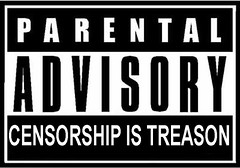In recent weeks, we've witnessed the President pro tempore of the Senate rant about this pesky "tube"-driven Internet, Grandpa Simpson-style.
And telecommunications companies have their lobbyists. Open Access folks have their grassroots movements. The fight for net neutrality continues to rage, online and offline...
And now this.
While those sneaky lil devils in Washington thought no one was looking...
House Passes Broad Mandatory Filtering Bill
Center for Democracy and Technology, July 27, 2006
(Via FreePress.Net)
The House of Representatives has passed a bill that would force schools and libraries to block chat and social networking sites as a condition of receiving federal E-rate funding.
This bill goes far beyond the already broad mandate that requires schools and libraries to filter out obscenity and “harmful-to-minors” content and would block access to many legal and valuable web sites and Internet tools. Because chat and social networking are woven into the fabric of Internet communication, a huge range of sites may be declared off limits in libraries and schools...
- READ SUMMARY OF H.R. 5319 HERE -
Now this is some truly scary "let's get those seniors and soccer moms all paranoid before the midterm elections" shit.
Hmmm...
Looks to me like that ol' pesky Internet is being used to stir up tech-paranoid voters.
I'm not even gonna bother denouncing this stupid bill, because, well, some things should be self-evident.
Damn you, Internet. You and your pesky tube-driven politicians...













9 comments:
There's a reason politicians hate the net. It takes five minutes as opposed to four years to figure out how crappy they are.
You sexy mother-fucker I can't stand it. Love your new cowboy pic. Just saw Brokeback, and it made me think of you. Post another pic of your bicep, or any other body part for that matter.
that sucks
I wish I could say like you that some things should be self-evident, but to those tubed legislators, there is no such thing. As to those who voted for them, I would not trust them to find their rear end if they had a map to it and written directions.
What the hell?
You turn your back for FIVE minutes and look what happens! These damn elected officials are more trouble than a pack of five-year olds.
omg that's the strangest librarian pic i've ever seen.
no way you live in oxford though. i'd have noticed you when i was a student at miami :-p
hmm tubes.. perhaps we need to tie those senators and representative tubes up , so they can't breed. if they can't breed the senator species of old coots pass off and the young can replace them finally...
hmm my scissors are ready, lets go start a scissor waving movement! wouldn't that cause a few politicians to wince??
Spared:
Hey, thanks for stopping by. Yep, very true. It was easier for politicos to hide out back in the old offline print-only days.
Anon:
Lmao. Too funny. If you're who I think you are, well, lol, watch out for those California inmates ;)
Coop:
Yup. Very much so.
Dances with Books:
Oh, I agree. And, of course, we're dealing with the worst part of bipartisanship as well. Oh hell...the Dems and GOP haven't been able to find a platform in a decade...why should anybody expect them to understand anything about the Net?
Kt:
Lol...I was actually thinking they were more trouble than a pack of rabid bunnies, but... ;)
Lisa:
Um thanks, I think. And thanks for stopping by, too :)
And yeah, sadly, I live in Oxford. Depends when you were here as to whether or not you'd have noticed me :)
Casey:
Lmao...yeah, politico breeding seems to be a problem. No more children-of-politicians-politicians. Or spouses-turned-politicians politicians, either.
PERIOD.
It's a tricky one, J, especially for a fence-sitter such as myself.
The Libertarian in me agrees, saying the freedom to communicate is most important, and that chats and social networking and all that jazz should be allowed therefore. The opportunity to communicate, to speak, should never be limited, especially for those who can't use it anywhere else.
But therein lies the tricky part - what about those who can?
The Librarian in me goes the other way. Here's the rock and hard place: as a librarian I've come across this situation a number of times. Usage. By which I mean what are the limited number of library stations being used for? The librarian in me says that if someone needing to do research or a school project can't get on the library computer (yes, this is a bigger issue in academia than in the public sector, but it applies nevertheless), because some kid is updating their favorite movie stars on MySpace, well, I can see the argument there.
How many times have I had to field complaints that a place of research, study, and information-gathering (the library) has no available computers for the deadline-bound student because 12 teens booked all the machines to chat to each other via Messenger? This happens all the fucking time in public libraries, and more than likely the frustration of similar events is the genesis for the bill.
It's a frustrating place to be in - morally disagreeing with the bill but understanding the sense of it from an institutional perspective ... it's a tough call, really, as to which way to go on this one. Because although the immediate reaction is that it's a rights issue, it actually isn't at all. If it were, well, then the library would have no rules on content access (ie adults visiting 'adult' sites), either. No polices, no procedures - every one of those can be argued as a violation of rights, also, if taken in a certain point of view.
I can say that while I understand the genesis of the bill, I think actually presenting a bill is a step too far. This is an issue that should be left up to the individual library boards to decide for themselves. If they feel the majority of their users are frustrated at the Messengers and MySpaces of the Internet restricting their access to research tools, then by all means, make it a policy at that library to block Myspace and take Messenger off the machine. After all, the customer is always right. But if another library board feels it is not an issue, then by all means, leave the access there.
The real problem is the Big Brother that is the US Government has lost all faith and trust in the decisions of the common man, which were once long ago the very heart of democracy (when it actually briefly existed). The true democratic approach is to leave the government out of it, and let the libraries run themselves as their own entities. The client will only stay, after all, if the level of service meets his or her particular needs ... and with each library comes a vastly different array of clients, so how can one sweeping verdict applicable to all possibly be of benefit? That's where I come out.
Whew! Long two cents ... but it's always good to look at the other side, sometimes, too.
Peace bro,
G
Post a Comment